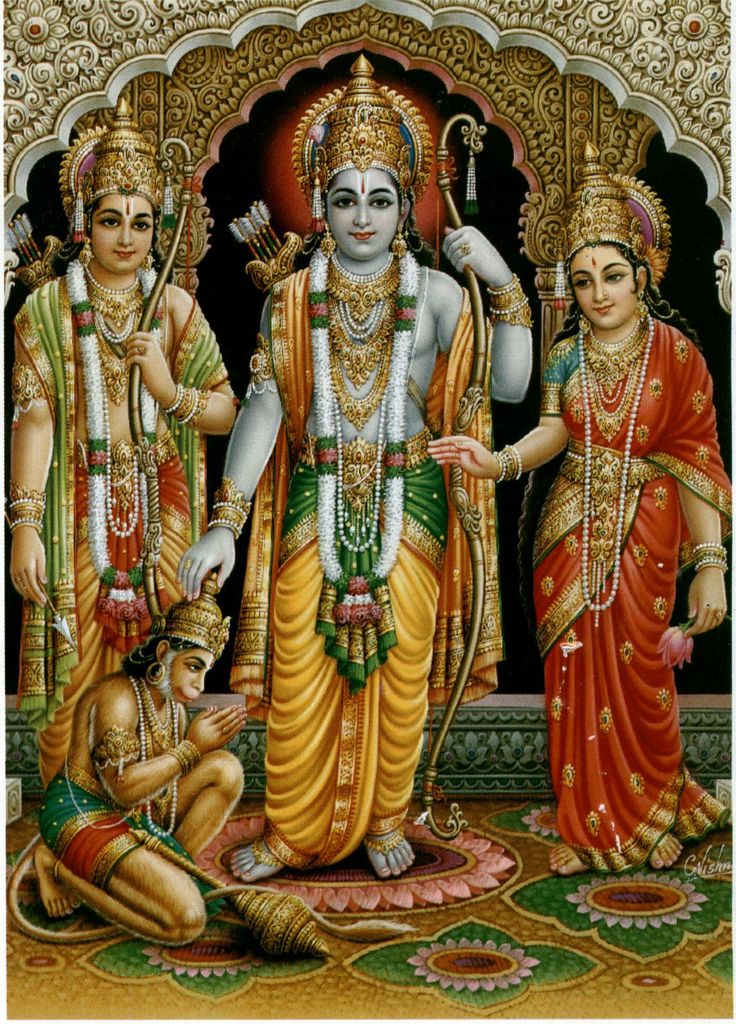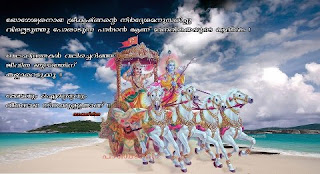8: Creation and Life After Death : 7.
The Teachings of the Bhagavadgita :
Bhutabhavodbhavakaro visargah karmasamjnitah (Gita 8.3) –
karma is understood to be action, Everybody knows what this word means – action. Karma, karma, karma – it is understood in a thousand ways.
"Oh, it is my karma," people say when they wail, weep over something, by which they mean their fate, or rather, more properly, the effect of what they did in the past, or what they do, what they have done, and so on. But more profound thinkers have understood by this word 'karma' here in this context – visarga, or the very process of the emanation of things from the Supreme Being. Visarga karmasamjnitah – the cosmic action, the original, universal impulse to diversify and project itself into this multiplicity of creation, this original creative will, as it were, may be said to be the visarga, the coming out of beings that is the karma, the original yajna, the first action.
This is one interpretation, and I am not trying to go into the other interpretations which may not be necessary for us –
bhutabhavodbhavakaro visargah karmasamjnitah.
Adhibhutam ksharo bhavah ( Gita -8.4):
All the perishable forms in creation are the kshara. Kshara means perishable, transient, passing.
Adhibhutam ksharo bhavah purushsah cidhidaivatam.
Here again there are varieties of understanding of the meaning of this statement. Adhidaiva is the superintending principle, the divinity transcending the subject-object relationship, the consciousness that is the connecting link between us and the world outside, the seer and the seen. These are all very difficult things to understand and will not be grasped merely by a single utterance of them. However, let them be told at least once so that a vibration may be produced for further studies. This is perhaps the most knotty point in the Bhagavadgita as far as the cosmology of it is concerned.
Bhutabhavodbhavakaro visargah karmasamjnitah, adhibhutam ksharo bhavah purushah cidhidaivatam adhiyajnoham evatra.
Here again we have a difficulty in understanding what adhiyajna is. Sometimes it is held that the whole field of performance in any manner whatsoever is adhiyajna – the divinity presiding over, superintending over, transcending, controlling, deciding, determining and judging. All activity in the universe is God as adhiyajna, the Supreme Being who receives the fruits of all our actions. This whole world is the field of activity. It is dharmakshetra-kurukshetra, and this field of action is the field of the performance of duty – svadharma. It is, therefore, a field of performance of sacrifice, yajna, and therefore it is holy land, the whole creation, this cosmos, this universe, this world, this society, this area which we are occupying is a sacred, sanctified dharmakshetra cosmically, where we perform our devout worship to the Almighty in the form of our duties, functions – whatever they be, whatever the shape they take.
These are very difficult things to understand, but very essential, so that a correct understanding of the mutual relationship of these principles among themselves will give us a strength to face the world and provide us with that internal inner energy by which we can direct our soul-consciousness in the direction of the object of our meditation. We are thrilled, enthused, stirred and stimulated by these descriptions because we know we are a cosmical citizen. We are not a man or woman living in a corner somewhere, in some state of India – we are a citizen of the whole of creation. We have, therefore, the support of the angels in heaven and the gods everywhere and the Supreme Being Himself. Thus, meditation becomes a cosmic activity. Yoga is a universal performance on our part, and this is the message of solace that the Bhagavadgita gives us.
To be continued ...
.jpg)
.jpg)
.jpg)


Comments
Post a Comment